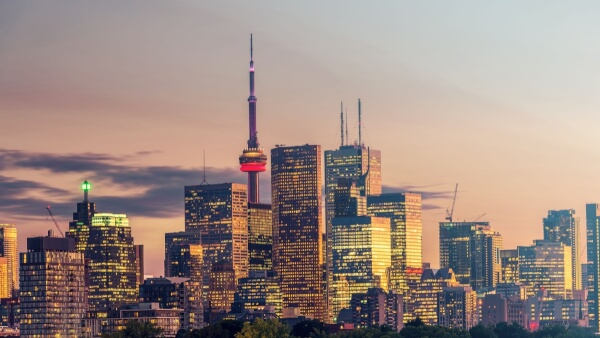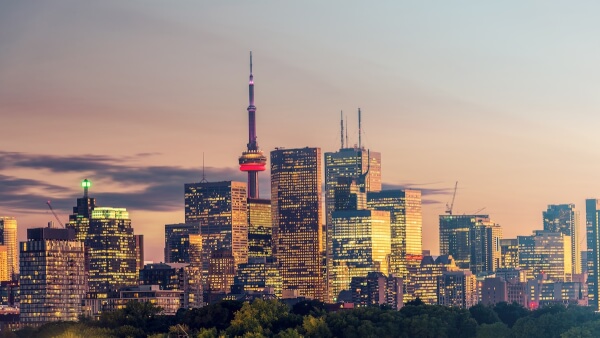How to import a car from Canada to the US
Bringing a car from Canada back to the US? Find out how to import a vehicle, including compliance tips and applicable fees.

Canada attracts many American property buyers and investors with its beautiful nature and strong infrastructure. So, you may be wondering, "Can a US citizen buy land in Canada?".
The answer is that yes, you can own land in Canada. However, recent legislation has created new restrictions on foreign property ownership that you'll need to navigate carefully.
Here's everything you need to know to successfully buy Canadian land.
You'll also learn about Wise, an easy way to send high-speed, low-fee transfers to Canada with no foreign exchange rate markup.
| Table of contents |
|---|
Americans can buy and own land in Canada without needing to become residents or citizens. However, there are a few important restrictions that apply.
The Prohibition on the Purchase of Residential Property by Non-Canadians Act, implemented in 2023 and recently extended to January 2027, affects property purchases in major urban areas.¹
According to this legislation, non-Canadians can't buy property in Census Metropolitan Areas or Census Agglomeration.
Census Metropolitan Areas are areas that have a total population of at least 100,000, with 50,000 or more living in the core.¹
Census Agglomeration are areas that have a population of at least 10,000.¹
This prohibition doesn't apply to properties outside of these zones, so you can still buy:
- Recreational land
- Farmland (with some provincial restrictions)
- Vacant lots outside metropolitan areas
- Land for vacation homes or cottages
- Ranch properties
This foreign buyer ban doesn't affect certain groups of foreigners, including permanent residents and certain types of temporary residents. Depending on your ties to Canada, you may be able to buy property in Canada without restrictions.
However, some provinces have their own separate restrictions as well:²
Other provinces generally allow unrestricted land purchases by Americans.
Purchasing land in Canada doesn't create a path to citizenship or residency. You can own land in Canada, but this ownership has no bearing on your immigration status.
Canada does offer some investment-based immigration programs, such as the Start-Up Visa Program for innovative businesses and the Quebec Immigrant Investor Program, but these are separate from property ownership and have their own specific requirements.³
You may also qualify for a work visa or residency through marriage to a Canadian.
| 💡 Learn more about Canada Investment Visas in our full guide. |
|---|
You'll find different land prices in Canada depending on the province. Here's a look at farmland values across different provinces*:
| Province | Price per acre (CAD)⁴ |
|---|---|
| Ontario | 19,685 CAD |
| British Columbia | 10,056 CAD |
| Quebec | 9,964 CAD |
| Newfoundland and Labrador | 8,642 CAD |
| Prince Edward Island | 6,452 CAD |
*Based on most recent data collected by the Canadian government in 2023
Since non-Canadians can't buy land in urban centers, you'll likely be looking at rural properties. These areas typically have more affordable prices since they're more remote and underdeveloped.
Property taxes in Canada fund local services like police, fire stations, schools, roads, and infrastructure maintenance. Each municipality sets its own tax rates, which typically range from 0.5% to 2.5% of the property's value.⁵
Here's a sample of property taxes that you can expect in different places in Canada.
| City | Property tax rate⁵ |
|---|---|
| Vancouver | 0.297% |
| Montreal | 0.594% |
| Calgary | 0.649% |
| Toronto | 0.715% |
| Winnipeg | 2.728% |
You'll need to pay property taxes regularly, such as annually or quarterly, depending on your municipality. When you buy your land, you'll also face a few one-time costs:
| Fee type | Typical cost⁶ |
|---|---|
| Real estate agent fees | 3-7% |
| Property inspection | 300-1,000 CAD |
| Legal fees | 900-2,000 CAD |
| Land transfer tax | 0.5-2.5% |
💡 The seller sometimes takes care of the real estate agent fees.
The municipality in which you're buying your Canadian land may have additional fees or required costs. For example, some provinces require you to get a new home warranty.

Now that we covered some of the basics, the only question left is: how to send money to pay for your property overseas?
Wise offers you a quick, secure and transparent way of sending money to Canada. You get the mid-market exchange rate for your payments and see how much it’s charged for the transfer before sending the money from your bank.
With the Wise Account you can also hold 40+ currencies, spend money in 150+ countries, and receive like a local in 9 different currencies.
Please see Terms of Use for your region or visit Wise Fees & Pricing for the most up to date pricing and fee information
The most important thing to remember when looking to buy land in Canada is to focus your search on the areas outside census-defined metropolitan areas and agglomerations.
This means that you typically can't buy land close to urban cities like Toronto and Vancouver, but you can explore more remote and rural areas.
💡 There are also a few exceptions that exist for non-Canadians.
For example, international students who have filed Canadian tax returns for 5 years, spent at least 244 days per year in Canada, and are looking to purchase property under $500,000 can buy land in Canada without restrictions.¹
Similarly, temporary workers with valid work permits who have at least 183 days remaining on their authorization and haven't previously purchased Canadian property are qualified, too.¹
You can find the full list of the exceptions to the Prohibition on the Purchase of Residential Property by Non-Canadians Act here.
Once you determine your eligibility, work with a qualified real estate agent who can help you identify properties that align with your status.
You can also look at listings on popular real estate websites, such as:
That said, if you fall under the restrictions of the Prohibition on the Purchase of Residential Property by Non-Canadians Act, your best bet is to work with a knowledgeable real estate agent who can point you in the right direction.
The process of buying land in Canada is similar to what you can expect in the US, but with the recent restrictions, it's important to pay attention to the details.
Work with an experienced real estate agent who specializes in land transactions and has experience working with foreign buyers. A knowledgeable agent will help you save time and money by identifying eligible properties and steering you away from options that aren't the best fit for your goals.
Your real estate agent should be licensed and have good reviews from past clients.
Under the Prohibition on the Purchase of Residential Property by Non-Canadians Act, you'll need to verify that your purchase is allowed.
Check if you fall into any of the exceptions, such as an international student or a temporary worker with a valid permit. If you have a Canadian spouse, that can also help you qualify.
Once you find a few properties that you like, your real estate agent will help you schedule viewings to check them out. Pay careful attention to these factors:
Topography and terrain: Study the land's contours, slopes, and physical features. A topographical survey will help you see potential building sites, drainage patterns, and any challenging terrain that could affect your construction costs
Soil quality: Do a professional test to check soil composition and stability, drainage capability, load-bearing capacity, and other important factors
Access: Make sure that the land isn't landlocked and there's either direct access to a public road or an opportunity to create one
Utility connection: Ask about the availability of electricity, water, and sewage at the property line and the cost of connecting utilities if not present
Local regulations: Check zoning requirements, minimum lot sizes, building height restrictions, and any special use permits that you might need for your construction on the land
Don't commit to anything before verifying all of the details. If you purchase land that has problems or restrictions, it can be very hard to sell it later.
If the due diligence checks out, your real estate agent will help you make an offer to the seller. If the seller accepts your offer, you'll move forward with drafting a formal purchase agreement that outlines the specific contingencies of the sale.
At this point, you may also have to put down a deposit - this is when having a Canadian bank account can come in handy.
To close the sale, you'll need to arrange for the rest of the funds to be transferred to the seller. Your lawyer will handle the registration of the property title, and you'll officially become the owner of the land. You'll also have to pay all of the relevant fees and taxes.
Many people need financing to be able to purchase property. Unfortunately, getting a loan for land in Canada as a foreigner can be difficult.
Canadian banks usually want a much bigger down payment from foreign buyers - typically 20-35% of the purchase price, sometimes even more.⁷
They'll also take a close look at your financial situation and expect a high, stable income and a good credit score.
So, while there's nothing legally preventing you from applying for a mortgage in Canada, it can be hard to get approved.
If Canadian banks don't work out, you have other options.
You could work with international lenders who specialize in overseas property purchases. Another option is getting a loan from your US bank. Depending on who you bank with, they may have options for international mortgages.
Buying land in Canada as an American is possible, but there are important restrictions to take into consideration.
According to the Prohibition on the Purchase of Residential Property by Non-Canadians Act, you'll only be able to purchase land in areas outside of major cities where foreign ownership is allowed.
These restrictions will be in place until at least January 2027.¹
If you have ties to Canada, such as living there as a temporary worker with a valid work permit, you may qualify for an exception.
That said, buying land in rural and remote areas is still possible and could be a great investment for Americans. Make sure to work with a knowledgeable real estate agent who will point you in the right direction to make the most of your budget.
To send high-speed, low-fee transfers to Canada, even for large transfers, use Wise.
Sources
*Please see terms of use and product availability for your region or visit Wise fees and pricing for the most up to date pricing and fee information.
This publication is provided for general information purposes and does not constitute legal, tax or other professional advice from Wise Payments Limited or its subsidiaries and its affiliates, and it is not intended as a substitute for obtaining advice from a financial advisor or any other professional.
We make no representations, warranties or guarantees, whether expressed or implied, that the content in the publication is accurate, complete or up to date.

Bringing a car from Canada back to the US? Find out how to import a vehicle, including compliance tips and applicable fees.

Learn the boat import duty from Canada to the US: rates, taxes, paperwork and required documentation, NAFTA/USMCA rules, exemptions, and timeline.

Are you looking for the best property management companies in Ottawa? Find out all about the top local providers to take care of your home overseas.

Are you looking for the best Airbnb management companies in Toronto? Find out all about the top local providers to take care of your rental property overseas.

Moving to Canada from the US? This guide covers all the essential information for relocating to Canada as an American, including tips and insights.

Want to learn about property taxes in Canada? This guide covers types of property taxes and how they are calculated to help you navigate the process.